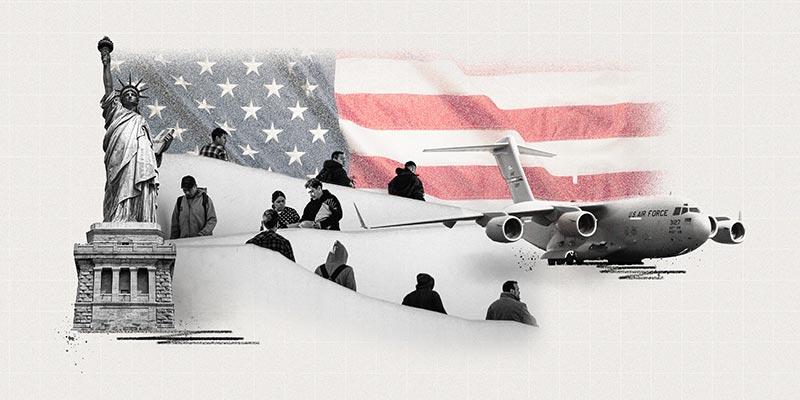PRINCETON, NJ -- Could John McCain benefit from Barack Obama's much-publicized foreign trip? Several observations from the just-completed USA Today/���۴�ýpoll suggest that this is a possibility.
Americans' overall reaction to the trip was muted, as shown in the accompanying results.
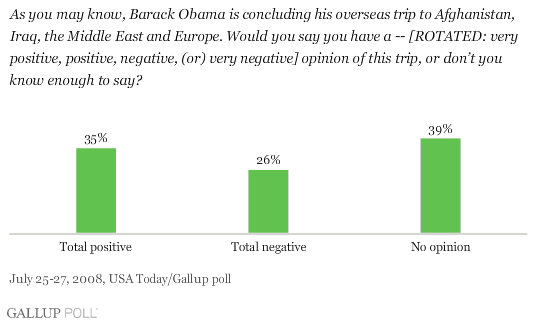
Thirty-five percent had a positive opinion, while 26% had a negative opinion, with the rest -- more than a third -- saying they didn't know enough about the trip to be able to say.
Not surprisingly, there were highly partisan reactions to the trip. Notably, Democrats are slightly less likely than Republicans to have an opinion on the trip at all.
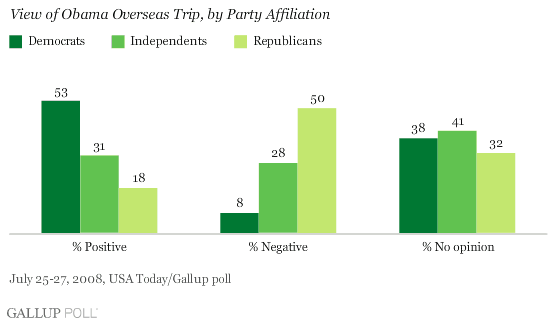
The slightly higher degree of attention Republicans paid to the trip could in part reflect the fact that Republican leaders -- including McCain himself and, in particular, conservative commentators -- were highly vocal in their efforts to blunt the impact of the trip and were quick to criticize and politicize it, finding fault with Obama for a number of reasons at almost every stop.
The heavy coverage of the trip may have fueled speculation (or reinforced pre-existing attitudes) about news media bias in Obama's favor. A separate set of questions in the weekend poll asked Americans about their views of the news media's coverage of the two major-party candidates. Americans are more than twice as likely to say media coverage of Obama is unfairly positive as to say it is unfairly negative. For McCain, the opposite is true, with many more seeing coverage of him as unfairly negative than as unfairly positive.
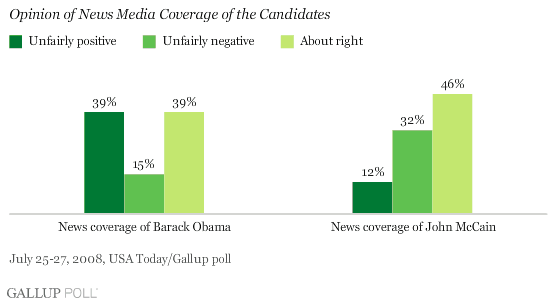
The differences in views of the media are enormous between those who are voting for McCain and those voting for Obama. In general, McCain voters largely believe their candidate is being treated unfairly while Obama is getting overly friendly media coverage. In turn, Obama voters tend to view the media coverage of both candidates as even-handed.
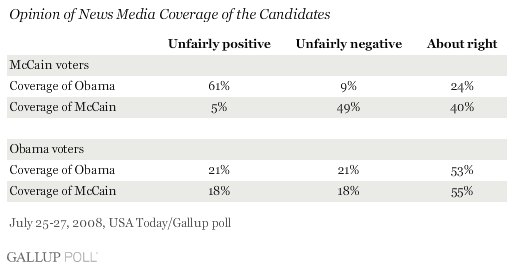
Since the previous USA Today/���۴�ýpoll, Obama's image has suffered to some degree, while McCain's has slightly improved. In the June 15-19 poll, 64% of Americans had a positive view of Obama, compared with 61% today. McCain's favorable rating has increased from 59% to 62%.
While those changes are not large, the most interesting finding is that the change in opinions of Obama has come only among Republicans and independents; Democrats' views of Obama (and of McCain, for that matter) have not changed.
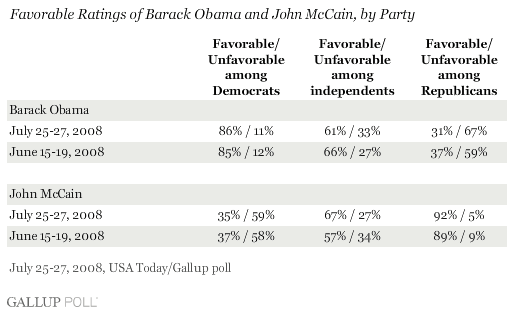
These changes, which are all relatively slight, may reflect the type of normal fluctuation one sees in election seasons, or perhaps emerging negative reactions over his recent trip.
The trip may also be responsible for the finding of a in the new USA Today/���۴�ýpoll. McCain gains among likely voters compared to registered voters in this poll, something he has not done in previous USA Today/���۴�ýpolls this year.
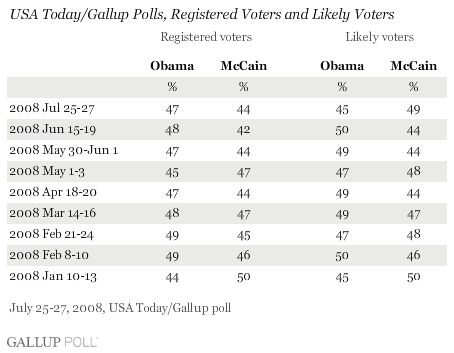
The reasons for the shift between registered and likely voters in this poll compared to previous polls is not entirely clear, but the data show that in this poll, Republicans have become slightly more likely to say they are giving quite a lot of thought to the election, while independents and Democrats are giving less thought -- compared to what has been the case throughout this year. In other words, Republicans have become more attentive to the election on a relative basis, which increases their percentage of the likely voter pool. A Democratic advantage in thought given to the election (and indeed in qualifying as a likely voter, according to Gallup's model) is not the norm historically, so in some ways, after the excitement of the Democratic nomination campaign has subsided, the current poll may suggest that the electorate is returning to a more normal state of affairs.
Implications
It is difficult to pinpoint the exact causes of any of these changes. But the available data show that Republicans are strongly convinced that the media are much too positive in their coverage of Obama and too negative in their coverage of McCain. The media's coverage of Obama's foreign trip, coupled with a strong reaction from McCain and other conservatives, may have created the seemingly paradoxical effect of increasing Republicans' energy and excitement about voting for McCain. If this is the case, the degree to which this is short-term versus long-term is still not clear.
Survey Methods
Results are based on telephone interviews with 1,007 national adults, aged 18 and older, conducted July 25-27, 2008. For results based on the total sample of national adults, one can say with 95% confidence that the maximum margin of sampling error is ±3 percentage points.
Interviews are conducted with respondents on land-line telephones (for respondents with a land-line telephone) and cellular phones (for respondents who are cell-phone only).
In addition to sampling error, question wording and practical difficulties in conducting surveys can introduce error or bias into the findings of public opinion polls.
To provide feedback or suggestions about how to improve Gallup.com, please e-mail feedback@gallup.com.
